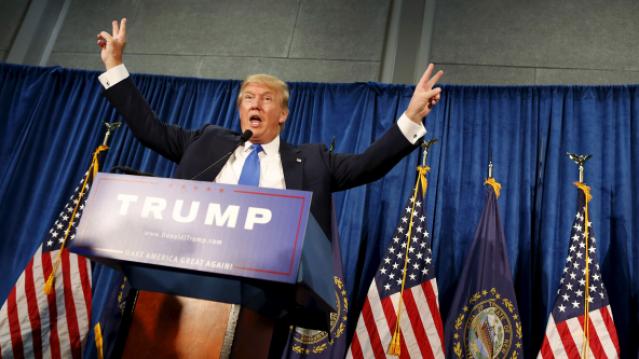Donald Trump Isn’t as Rich as He Says…but He’s Still Pretty Rich

“I’m really rich,” Donald Trump boasted last month when he announced he was running for president. A new analysis by Bloomberg confirms that claim, but finds that the real estate mogul and presidential candidate is worth about $7 billion less than he claims.
When he announced his presidential bid, Trump touted a net worth of about $8.7 billion, a figure that soon ballooned to $10 billion. But Bloomberg calculates his wealth closer to around $2.9 billion. The Bloomberg Billionaires Index, a daily ranking of the world’s biggest fortunes, arrived at the value using both prior-known information and a 92-page personal disclosure form that Trump filed with the Federal Election Commission.
Related: 7 Revelations from Donald Trump’s Financial Disclosure
The federal form that all presidential candidates are required to submit asks only for broad ranges in asset values, not specific sums. Anything above $50 million in value is lumped together in one category, which in Trump’s case left plenty of room for questions about just how valuable some of his assets are. The federal report also doesn’t require candidates to list personal property like art, clothing or real estate that’s for his own use.
The Bloomberg analysis went into much more depth, using figures such as purchase dates, square footage, rental rates and more.
The disclosure form revealed that most of Trump’s fortune comes from real estate holdings, such as the Trump Doral resorts in Florida and Trump Tower on Fifth Avenue in New York City. Other lucrative properties include premier golf courses in the U.S., Ireland and Scotland.
Related: Donald Trump Just Showed Why His Campaign Is Doomed
Trump had valued his golf and resort properties at $2 billion. Bloomberg, using price-to-sales ratios for similar properties, put the value at a combined $570 million.
The Bloomberg methodology also doesn’t put much value in the Trump brand, counting only the cash being held as part of licensing or other business deals. “Trump’s own estimations,” Bloomberg noted, “include much higher values for his brand.”
Top Reads from The Fiscal Times:
- Huckabee Trounces Trump in the Shameless Shock Game
- You’re Richer Than You Think. Really.
- 15 Facts You Didn’t Know About Donald Trump
Marco Rubio Says There’s No Proof Tax Cuts Are Helping American Workers

Sen. Marco Rubio (R-FL) told The Economist that his party’s defense of the massive tax cuts passed last year may be off base: “There is still a lot of thinking on the right that if big corporations are happy, they’re going to take the money they’re saving and reinvest it in American workers,” Rubio said. “In fact they bought back shares, a few gave out bonuses; there’s no evidence whatsoever that the money’s been massively poured back into the American worker.”
For Richer or Poorer: An Updated Marriage Bonus and Penalty Calculator

The Tax Policy Center has updated its Marriage Bonus and Penalty Calculator for 2018, including the new GOP-passed tax law. The tool lets users calculate the difference in income taxes a couple would owe if filing as married or separately. “Most couples will pay lower income taxes after they are married than they would as two separate taxpayers (a marriage bonus), but some will pay a marriage penalty," TPC’s Daniel Berger writes. “Typically, couples with similar incomes will be hit with a penalty while those where one spouse earns significantly more than the other will almost always get a bonus for walking down the aisle.”
Trump Administration Wants to Raise the Rent

Housing and Urban Development Secretary Ben Carson will propose increasing the rent obligation for low-income households receiving federal housing subsidies, as well as creating new work requirements for subsidy recipients. Some details via The Washington Post: “Currently, tenants generally pay 30 percent of their adjusted income toward rent or a public housing agency minimum rent not to exceed $50. The administration’s legislative proposal sets the family monthly rent contribution at 35 percent of gross income or 35 percent of their earnings by working 15 hours a week at the federal minimum wage -- or approximately $150 a month, three times higher than the current minimum.” (The Washington Post)
New Push for Capital Gains Tax Cut

Anti-tax activists in Washington are renewing their pressure on lawmakers to pass new legislation indexing capital gains taxes to inflation. The Hill provided an example of such indexing that Grover Norquist recently sent to Treasury Secretary Steven Mnuchin: “Under current policy, someone who made an investment of $1,000 in 2000 and sold it for $2,000 in 2017 would pay capital gains taxes on the $1,000 difference. But if capital gains were indexed, the investor would only pay taxes on $579, since $1,000 in 2000 would be equivalent to $1,421 in 2017 after adjusting for inflation.” Proponents of indexing say it’s just a matter of fairness, but critics claim that it would be just another regressive tax cut for the wealthy. Indexing would cost an estimated $10 billion a year in lost revenues. (The Hill)
Bernie Sanders to Propose Plan Guaranteeing a Job for Every American

Sen. Bernie Sanders (I-VT) is preparing to announce a plan for the federal government to guarantee a job paying $15 an hour and providing health-care benefits to every American “who wants one or needs one.” The jobs would be on government projects in areas such as infrastructure, care giving, the environment and education. The proposal is still being crafted, and Sanders’ representative said his office had not yet come up with a cost estimate or funding plan. Sen. Kirsten Gillibrand (D-NY) last week tweeted support for a federal jobs guarantee, but Republicans have long opposed such proposals, saying they would cost too much. (Washington Post)
